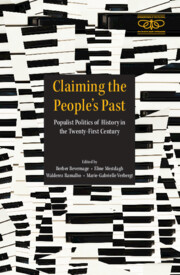
- Cited by 1
-
Cited byCrossref Citations
This Book has been cited by the following publications. This list is generated based on data provided by Crossref.
Leser, Julia Bareither, Christoph and Macdonald, Sharon 2024. Populist truth-making: a conceptual approach to populism in the context of European museums. International Journal of Heritage Studies, p. 1.
- Publisher:
- Cambridge University Press
- Online publication date:
- May 2024
- Print publication year:
- 2025
- Online ISBN:
- 9781009453615
- Subjects:
- History, Political Economy, Political Sociology, Politics and International Relations, Comparative Politics, Global History


